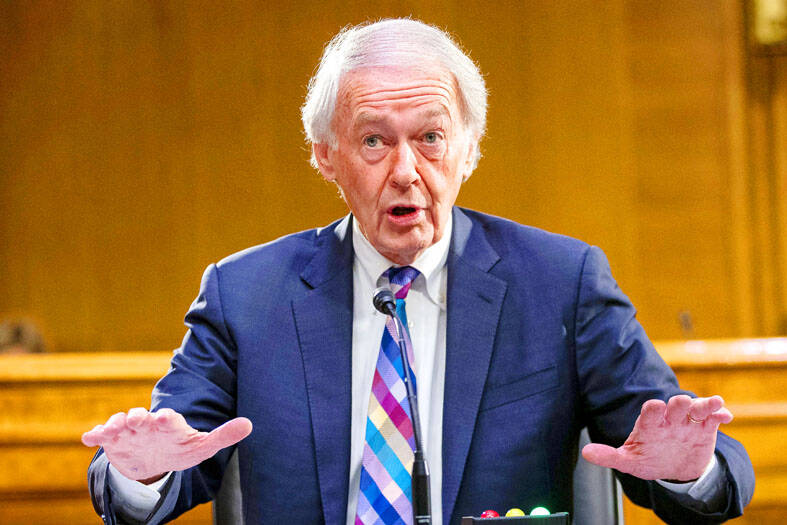US Senator Ed Markey on Thursday criticized China for destabilizing the Taiwan Strait and called on the US government to take actions that would put Taiwan in the strongest defensive position possible.
The US must take actions that have substantial benefits for Taiwan’s defense, and avoid measures that put Taiwan at risk, Markey said in a prerecorded video played at a seminar at the Center for Strategic and International Studies, a Washington think tank.
With China supporting Russia’s war in Ukraine and continuing to adopt aggressive policies toward Taiwan, it is not a simple challenge to deal with the Chinese threat, he said.

Photo: AP
Although the US and China are not locked in a new cold war, the US must still carefully observe China’s intentions, he said.
It should also demonstrate unity with allies and partners, and still cooperate with China when necessary, Markey said, adding that the US must avoid unnecessary provocations in dealing with China.
Communication channels must be open to avoid “fatal miscalculations,” he said.
The world must be made aware that it is China — not Taiwan or the US — that is trying to change the “status quo” in the Taiwan Strait, Markey said, citing Beijing’s overreaction to a visit to Taiwan by US House of Representatives Speaker Nancy Pelosi in August, despite similar visits having been made in the past.
To avoid China unilaterally changing the “status quo,” the US must ensure Taiwan is in the best position possible to defend itself and also make regional allies aware that the US is committed to Taiwan’s defense, but would do everything in its power to avoid a conflict, he said.
However, the US must also avoid actions that put Taiwan at risk without providing any substantial benefit, he said.
Markey said the proposed “Taiwan fellowship act,” which passed the US Senate in a bipartisan vote on June 8 last year, would enhance the connection between the people of both nations, and support Taiwan’s self-defense and security interests.
The purpose of the act, according to the US Congress Web site, is to strengthen the US-Taiwan strategic partnership through assigning US officials to spend time in Taiwan to learn Mandarin, and improve their knowledge of the politics, history and culture of Taiwan and the Indo-Pacific region.
The act also seeks “to better position the United States to advance its economic, security, and human rights interests and values in the Indo-Pacific region.”

SECURITY: As China is ‘reshaping’ Hong Kong’s population, Taiwan must raise the eligibility threshold for applications from Hong Kongers, Chiu Chui-cheng said When Hong Kong and Macau citizens apply for residency in Taiwan, it would be under a new category that includes a “national security observation period,” Mainland Affairs Council (MAC) Minister Chiu Chui-cheng (邱垂正) said yesterday. President William Lai (賴清德) on March 13 announced 17 strategies to counter China’s aggression toward Taiwan, including incorporating national security considerations into the review process for residency applications from Hong Kong and Macau citizens. The situation in Hong Kong is constantly changing, Chiu said to media yesterday on the sidelines of the Taipei Technology Run hosted by the Taipei Neihu Technology Park Development Association. With

CARROT AND STICK: While unrelenting in its military threats, China attracted nearly 40,000 Taiwanese to over 400 business events last year Nearly 40,000 Taiwanese last year joined industry events in China, such as conferences and trade fairs, supported by the Chinese government, a study showed yesterday, as Beijing ramps up a charm offensive toward Taipei alongside military pressure. China has long taken a carrot-and-stick approach to Taiwan, threatening it with the prospect of military action while reaching out to those it believes are amenable to Beijing’s point of view. Taiwanese security officials are wary of what they see as Beijing’s influence campaigns to sway public opinion after Taipei and Beijing gradually resumed travel links halted by the COVID-19 pandemic, but the scale of

A US Marine Corps regiment equipped with Naval Strike Missiles (NSM) is set to participate in the upcoming Balikatan 25 exercise in the Luzon Strait, marking the system’s first-ever deployment in the Philippines. US and Philippine officials have separately confirmed that the Navy Marine Expeditionary Ship Interdiction System (NMESIS) — the mobile launch platform for the Naval Strike Missile — would take part in the joint exercise. The missiles are being deployed to “a strategic first island chain chokepoint” in the waters between Taiwan proper and the Philippines, US-based Naval News reported. “The Luzon Strait and Bashi Channel represent a critical access

Pope Francis is be laid to rest on Saturday after lying in state for three days in St Peter’s Basilica, where the faithful are expected to flock to pay their respects to history’s first Latin American pontiff. The cardinals met yesterday in the Vatican’s synod hall to chart the next steps before a conclave begins to choose Francis’ successor, as condolences poured in from around the world. According to current norms, the conclave must begin between May 5 and 10. The cardinals set the funeral for Saturday at 10am in St Peter’s Square, to be celebrated by the dean of the College